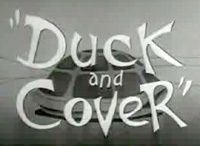Herblock's History: Political Cartoons from the Crash to the Millennium

The 150 cartoons presented here were drawn between 1929 and 2000 by three-time Pulitzer Prize-winning political cartoonist Herblock (Herbert Block). Cartoons comment on major events and public issues.
The website also presents an essay by Block on "the cartoon as an opinion medium"; a biographical essay; and 15 caricatures of the cartoonist by well-known colleagues. Cartoons are organized according to 13 chronological sections, with an additional segment devoted to presidents. Brief annotations provide historical context for each image.
A tribute site by the Washington Post, Herblock's longtime employer, offers additional cartoons and essays by Block.


